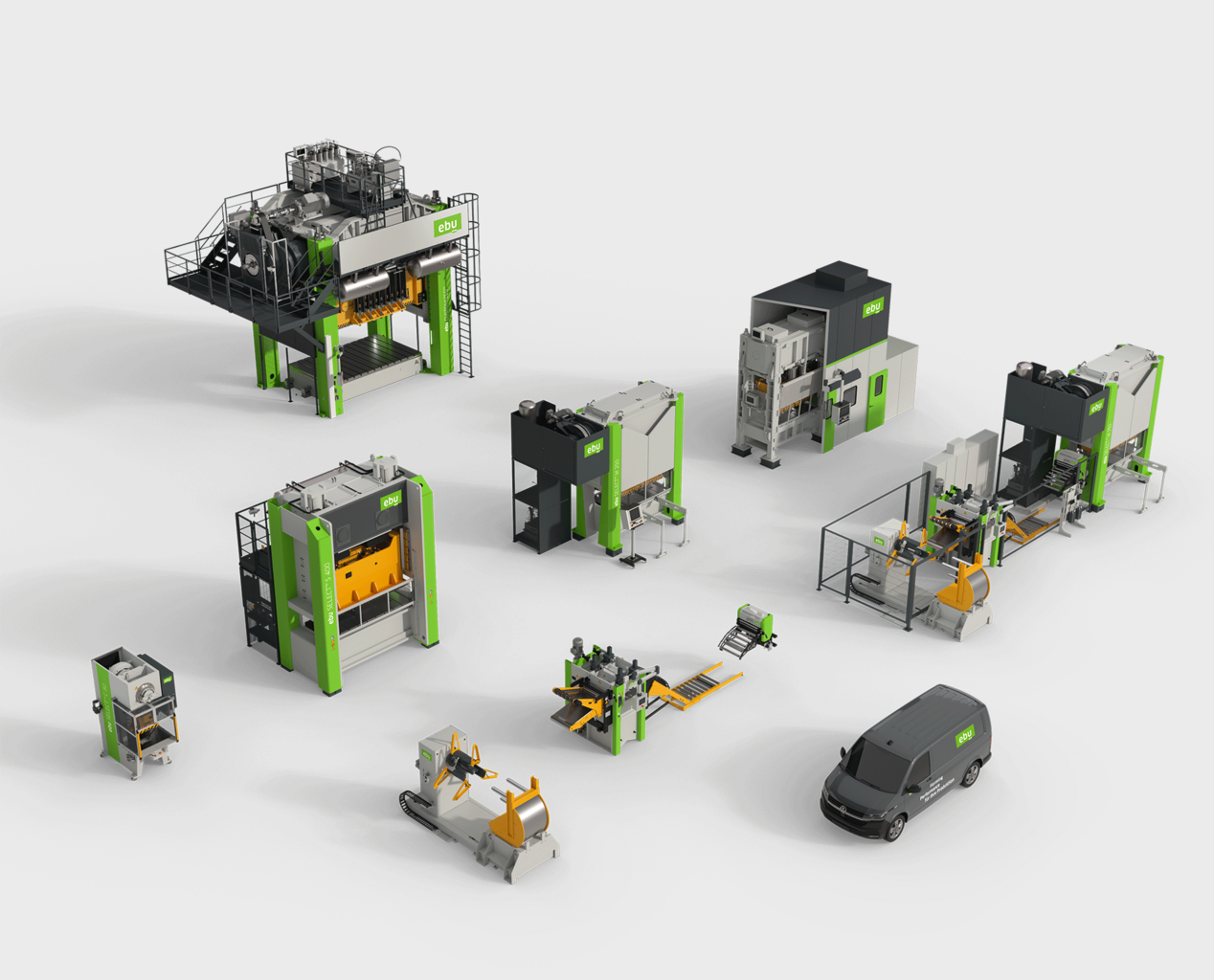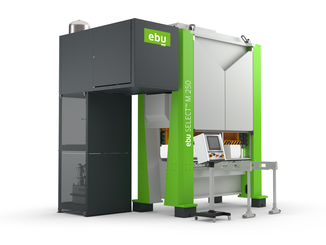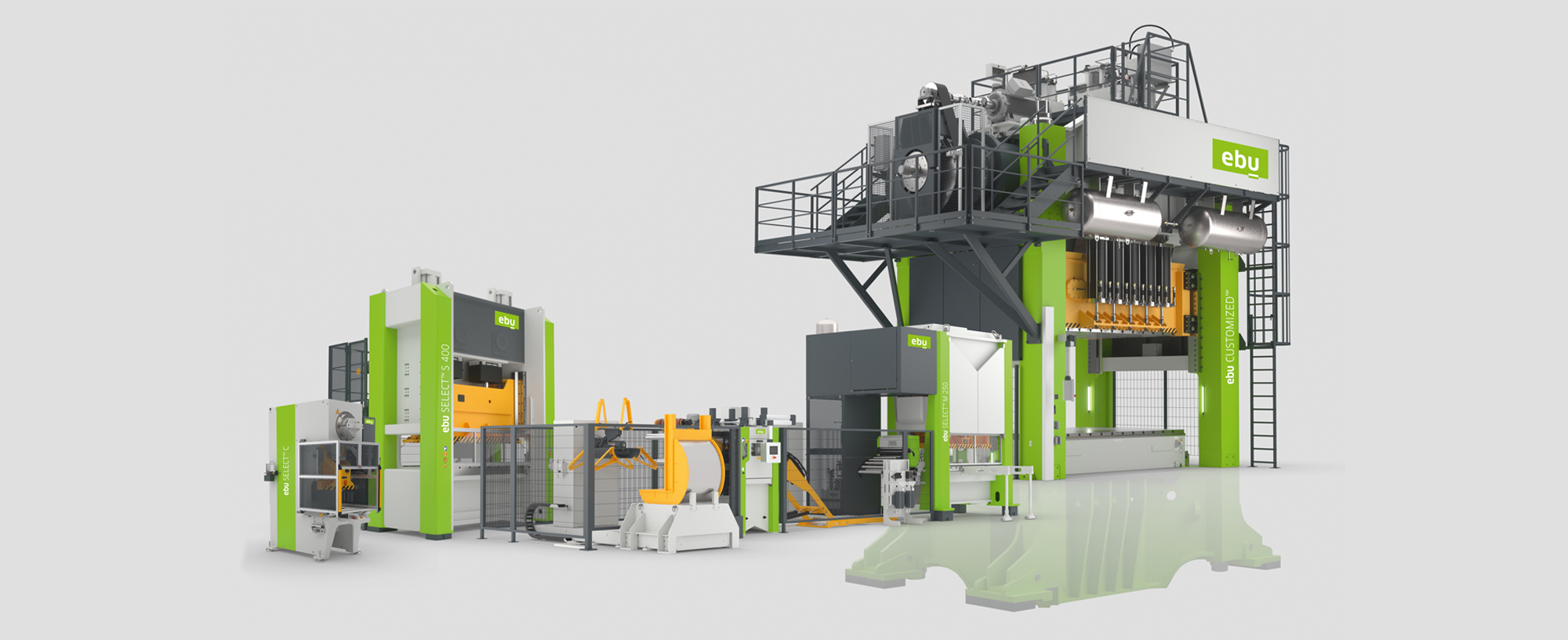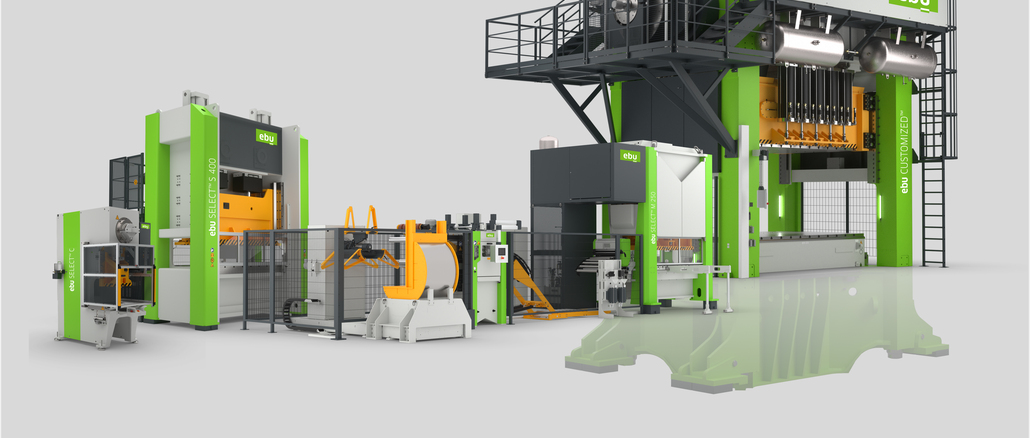
The Bayreuth-based press manufacturer Ebu Umformtechnik is expanding its product range of high-tech stamping presses and introducing new standardized press series and a comprehensive cross-module system for press modules. At EuroBlech, Ebu will show a fineblanking pad integrated into the press table, thus enabling the production of fineblanked parts on standard presses.
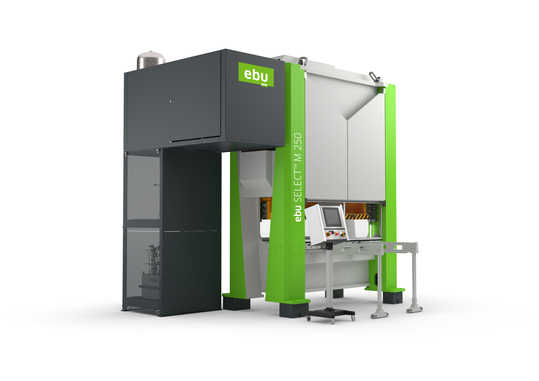
© Ebu
Ebu Umformtechnik GmbH is known for its modular and customized high-end punching systems. The company has now extended its product range to include standardized presses in the mid-range and low-cost segments and expanded its modular system into a cross-module system covering all press series. The Bayreuth-based company thus offers series-produced machines for various market sectors at – in its own estimation – attractive prices. And standardization creates room for innovative developments: At EuroBlech, Ebu Umformtechnik is exhibiting together with Webo a 2500 kN standard press on which fineblanked parts can also be produced. A fine cutting pad is integrated into the machine for this purpose.
Many advantages through standardization
For more than 20 years, ebu has been using a modular concept for the construction of automatic punching presses and complete lines. So far mainly for the implementation of customer-specific solutions, often at the technical limits. “We continue to do such lighthouse projects,” says Stephan Mergner, who was Technical Manager at Ebu Umformtechnik until 2009, before taking on various managerial roles at other companies. Since spring 2020, he has been running the business in Bayreuth together with Mark Malkomes. “What was missing was standard presses in the medium and lower price segments, for which there is a relatively large market.”
In this situation, Ebu Umformtechnik rethought its previous business strategy and standardized and expanded the existing modular system. “We looked at the preferred sizes of the last ten years and thus generated three series with fixed sizes in addition to our individual presses,” Stephan Mergner emphasizes. In the future, there will be eight press sizes in the steel-welded monobloc version of the ebu Select M series, five in the ebu Select G with split press body, and three in the smart low-cost ebu Select S series, each with fixed press forces and table sizes. In addition, Ebu Select C is a newly designed series of C-frame presses.
The interfaces are standardized for all sizes of the standardized series. And as far as possible, components and assemblies from the drives to the power-transmitting elements to the controls are designed as modules that can be interchanged across all series. Similar to the automotive industry, a large number of identical parts can be used to assemble different press types with cost-effective, mass-produced modules. At the same time, it facilitates the stocking of spare parts and provides the user with security in terms of spare parts availability over a long period of time. Even more, this transverse modular system makes it possible to adapt machines that have already been in operation for a longer period of time to new tasks by changing the modules. For example, a contract stamper whose orders change completely after perhaps five years could convert its automatic stamper to a machine suitable for deep drawing. With a transverse changeover to a servo drive, the machine then offers the required higher working capacity.
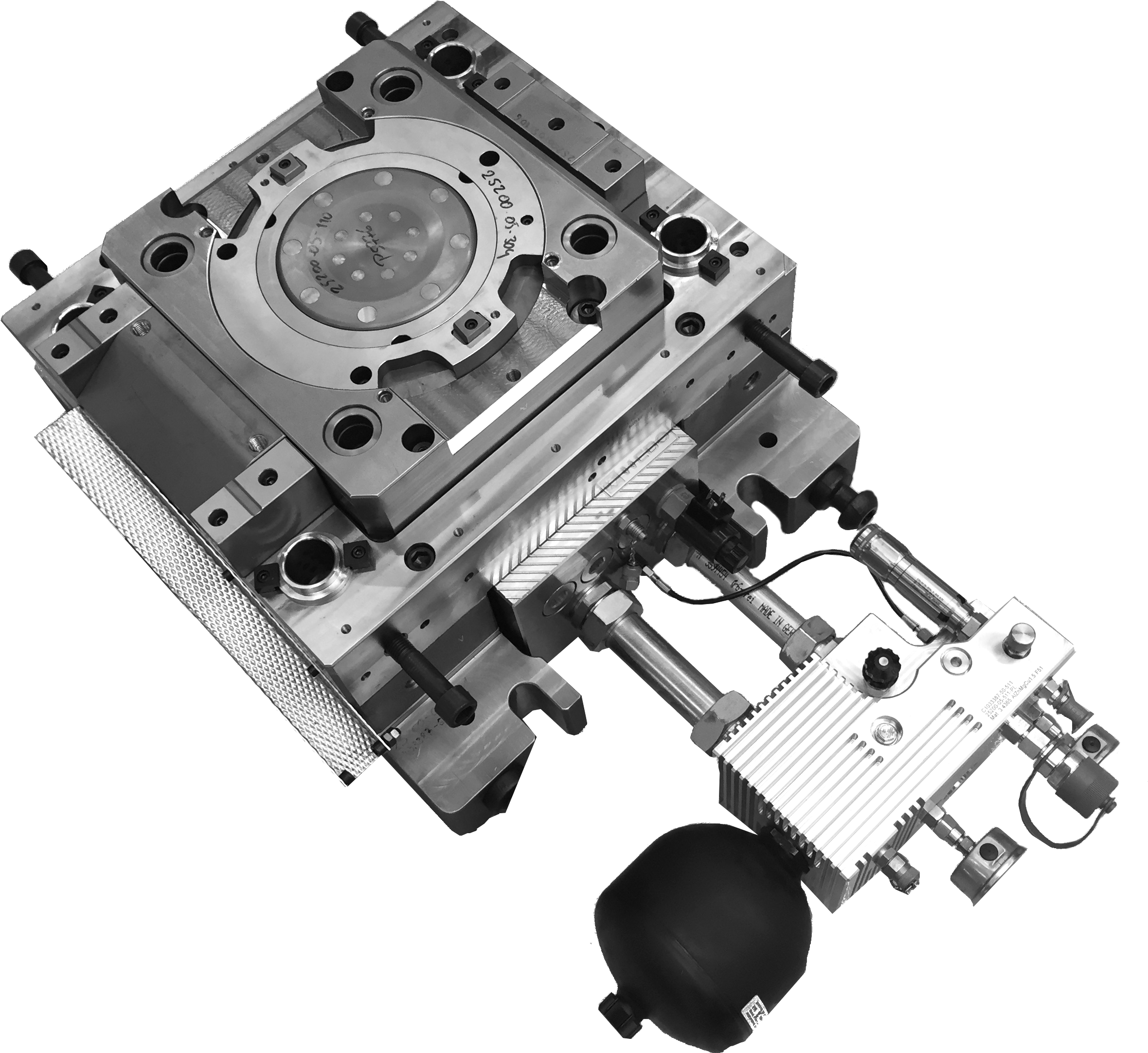
© Ebu
From the advantages of a transverse modular system
The two series, Ebu Select M and Ebu Select G, have evolved from the previous individual punch presses and operate with the longitudinal shaft drive favored at Ebu, which offers high speeds, performance and precision. Both series are built in Bayreuth and equipped with high-quality components from proven suppliers. They are intended for users who value quality, precision and performance, but are also prepared to compromise on equipment, for example.
If users are primarily concerned with price, Ebu will in future be bringing the new Ebu Select S series into play in the low-cost range. The machine is based on a proven press series from the Chinese press manufacturer Jiangsu Xuzhou Metalforming Machine Group Co., Ltd. which has been a shareholder of the Bayreuth-based company since 2016. Around 60 percent of the presses with a cost-effective transverse shaft drive are pre-assembled in China and completed by Ebu. The interfaces of this press series are standardized for the Ebu transverse modular system, so that Ebu modules can be swapped in. “These presses achieve a performance level that represents a good compromise between price and performance, but offer the identical control and automation options at a price advantage of around 40 percent,” summarizes Stephan Mergner.
The series are complemented by a new design of the Ebu Select C C-frame presses, which are also compatible with the transverse modular system. And the entire modular system would not be complete without the Ebu Automation automation package, which includes standardized components from the reel to the feeder for setting up complete lines. The standardization here extends to the interfaces for connecting devices and components from external Ebu suppliers. For example, an interface is provided in the control system for external feeds, which are thus integrated into the control system and the user interface of the Ebu control system.
With the transverse modular system and the standardized press series, complete plants can be put together comparatively quickly from the catalog. And the modular system is so versatile that customers can even choose between accommodating all the units either in a unit carrier above the press or in a power tower provided.
“We recently configured a complete system for a customer in just under an hour and a half,” says Stephan Mergner. Those who have special requirements beyond this will find a solution specifically tailored to the customer in the Ebu customized series.
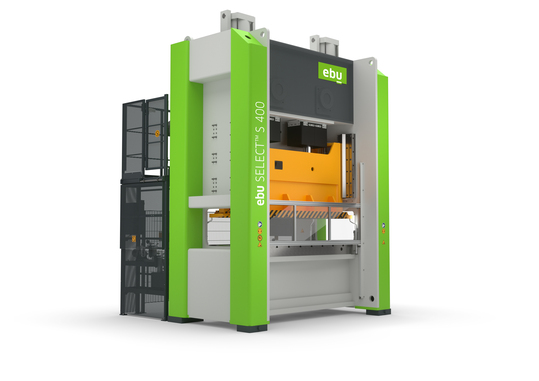
© Ebu
Fineblanking on standard presses
The standardization of the series creates room for creative and innovative ideas, emphasizes Stephan Mergner, because you don’t have to deal with the fundamental aspects again for every machine. One of these innovative ideas will be exhibited as a highlight at Euroblech: A standard press from the Ebu Select M series with 2500 kN press force and a fully integrated fine blanking pad from Webo. This tool allows fineblanking operations to be carried out on a universal press, for which a triple-acting press is usually used. During fine blanking, a counterholder supports the sheet on the side opposite the blanking punch, ensuring an almost 100 percent smooth cut and straight cut edges. Often the cut surfaces of the fineblanked parts can be used directly as functional surfaces.
Special fineblanking presses usually pay for themselves only with large quantities. In practice, die cuts are also sufficient for many components. Often only a few perforations or punchings in fine blanking qualities are required. Or for long progressive dies, counter holders are required at several positions. In these cases, the fine cutting pad helps. “This is a kind of drawing pad that we have integrated into the table and that forms the counterholder. The fineblanking pad can be moved longitudinally in the table and can be positioned at any point,” explains Stephan Mergner. The toolmaker Webo offers the patented system in its tools. This requires a press with greater die installation height. The integration of the Webo fineblanking pad was created through close cooperation between Webo and Ebu Umformtechnik and is offered in this form only by Ebu.
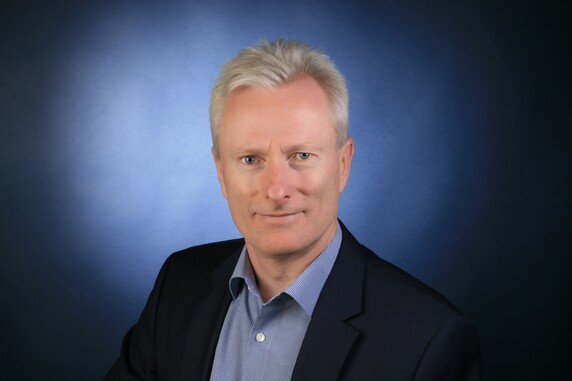
Stephan Mergner, Co-Managing Director at Ebu Umformtechnik
© Ebu
Immediately available machines
“We took a year’s break from the trade show because we didn’t want to go public with our new program until everything was working. Now we are ready,” Stephan Mergner explains the unusual break. Interested customers can view and check the machines and systems in operation at customers’ premises or in the factory halls in Bayreuth at any time. Due to series production, Ebu Umformtechnik also has a large number of machines with a high degree of completion available at short notice. In times of a problematic procurement market for standard mechanical and electronic components, this is an added bonus.
Euroblech Hall 27, Booth E93


